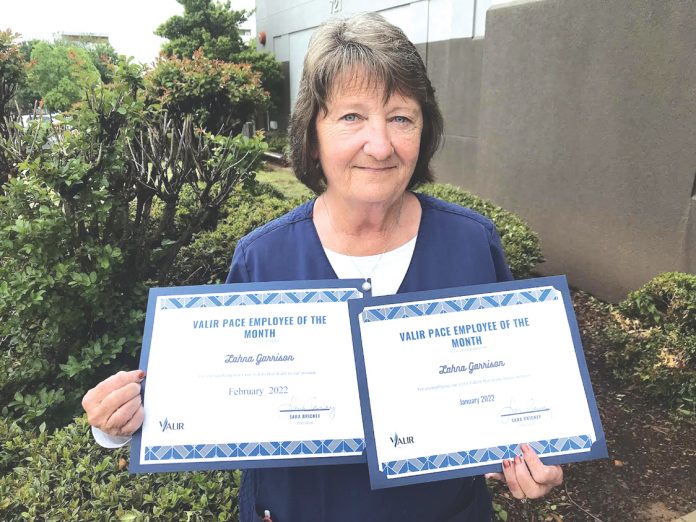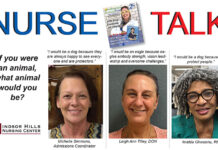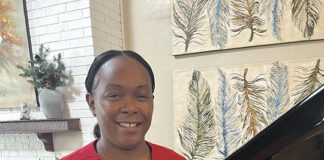
by James Coburn – staff writer
Being kind to the senior clients benefiting from the services provided by Valir PACE touches the life of Lahna Garrison, CNA, and the home care coordinator at the midtown Oklahoma City office.
“I love it — it’s very special to me — it gives me joy to know that I’ve helped somebody,” Garrison said. “I’ve worked at more than one place, but I don’t ever plan on leaving PACE until I retire. They go above and beyond to make sure the patients are taken care of. I’ve never experienced that anywhere else I’ve worked.”
She has been with Valir PACE for three years and for 15 years served as CNA for home health prior to joining PACE.
An act of kindness is more valuable than money, and Garrison demonstrates that in her personal life. In both January and February PACE awarded her with gas card money for being Employee of the Month.
“I felt it was only right to take that and split it down for all the aides, because without them I never would have gotten that,” she said.
PACE provides care for seniors in an all-inclusive setting of providers, said Sara Brickey, RN, president of Valir PACE.
“We provide them physical therapy, occupational therapy or speech therapy,” Brickey said.
PACE serves individuals 55 and older who reside in the Oklahoma City metropolitan area within a 50-mile radius. PACE serves seniors who must choose between medicine or food.
“There are so many things that can happen that can put you in that situation,” Garrison said. “And we want to be there for them to help lift them back up.”
There is no copay for any medication provided by PACE.
“My goodness, I have a wonderful staff. They come in every morning making sure everyone is doing good. They take their vitals and check on them every day here at the center making sure they’re eating and drinking, and doing activities with them,” Garrison said.
PACE also provides nutrition through the expertise of a dietitian. It offers home care, social services, counseling, and assistance with housing. Primary care providers and RN care coordinators instill best practices. Licensed practical nurses offer care at the center and participants’ homes. PACE also collaborates with the Department of Human Services.
Transportation is provided by PACE to any of their clients outside appointments such as dialysis or other specialty appointments.
“The aides really love it,” she said, and each patient is different. “The aides that are out in the field go out and help them with day-to-day living. It could be as simple as helping them take a shower, all the way down to cleaning their home or even doing their laundry.”
Some of the patients are extremely poor, she said, and cannot afford bath soap and shampoo. But the CNA’s make sure they have those items as well as supplies for individuals living with diabetes. A caring heart helps to develop connections with patients, opening trust and confidence. A caring heart gets things done, she explained.
“I’ve got a card over there that was sent to me with a basket of fruit,” she said. “It tells me that I did the right thing with their loved one in making sure everything was taken care of and everything was done in order for that patient to have that dignity about their life.”
Garrison has reason to feel good about her life. Her path as a caregiver began when she was the primary caregiver of family members. She understands there are times when people need to reach out and ask for help. PACE bridges the gap.
“We like to make sure that they’ve taken their medication,” she said.
An acute emergency can happen to anybody for several reasons, including unemployment, loss of a spouse, sickness, divorce and more.
No one should be embarrassed to ask for food or the necessities of life, Garrison said.
Visiting with a PACE staff member also helps diminish feelings of isolation by giving the patient someone to talk to, Garrison said. Sometimes their only other option includes going to a nursing home, she explained.
“The gratefulness they have to be on that program, to have the support that they need — you can’t ask for anything better than that,” she said.
CNAs are the eyes and ears of staff members. CNAs often notice subtle changes with patients and can alert the nursing staff. So, Garrison tries to keep the nurse aides consistent with the same patients whenever possible.
“That way when you walk into the home you pretty well know right away if there is something going on,” she explained. “You can tell by their expressions. You can tell by the way they carry themselves.”
Some of the clients need clothing. So, Garrison notifies the staff of what sizes she needs.
“The next thing I know, my desk is covered with the size I need so we can let the patient have them,” she said.
Visit: http://www.valirpace.org/ for more information











